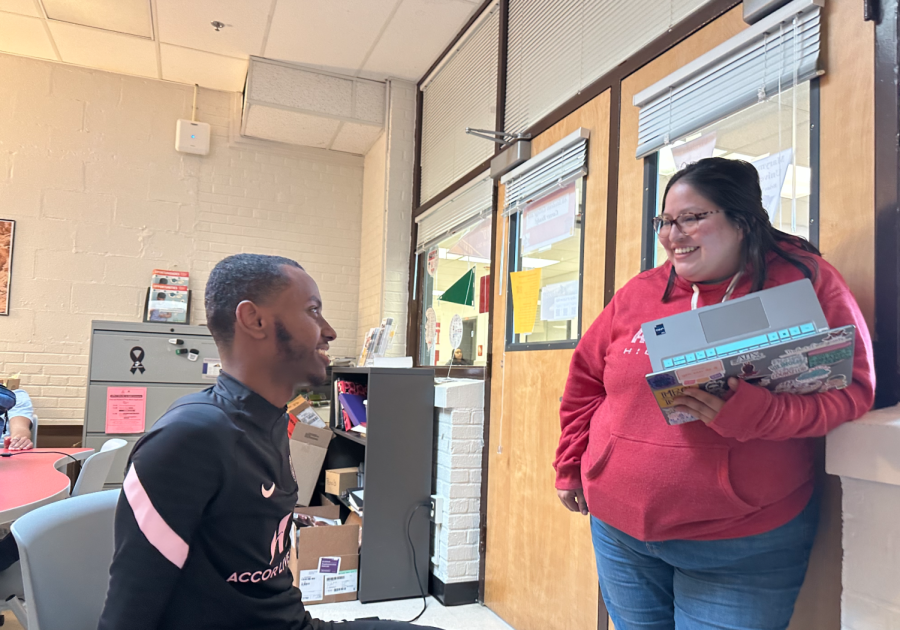Junior Mackenzie Wright’s pen clicks rapidly, her feet tap against her desk, and she keeps looking up at the clock wondering why time is going by so slowly. This sounds like many bored high school students, but the difference between Wright and other students is that she has been diagnosed with Attention Deficit Hyperactivity Disorder. In just fourth grade, Wright discovered that her severe inability to concentrate and focus in class was not due to boredom, but rather a disability that decreases her ability to focus.
“I had always been a good student and didn’t have any trouble with my homework until third grade when my parents noticed I was having trouble focusing on math problems. I used to be able to finish my homework in twenty minutes but then it started to take an hour or two,” Wright said. “It was really hard because I didn’t understand why all of the sudden I just couldn’t get it. My parents knew what was going on so they took me to the doctor in fourth grade and had me tested.”
Like Wright, many people are diagnosed with these types of disorders at a young age after experiencing the revealing symptoms of fidgeting, having difficulty remaining seated, being patient or following instructions. Talking excessively, constant interruptions and forgetfulness are also common symptoms of attention deficiency disorders that, in severe instances, can only be treated with prescribed medicine. Nonetheless, falling behind or struggling in school has become prevalently common among students suffering from ADD/ADHD.
Although Wright was diagnosed with ADHD and prescribed medicine, things did not get easier quickly. School became incredibly hard for Wright and her frustration only grew.
“It used to be really hard to pay attention, and I was extremely fidgety. I couldn’t remember what someone had just said and I wasn’t able to follow directions. I didn’t want to take the medicine that the doctor had given me because I thought they were going to change how I acted and change who I was so I would hide the pills in my pockets,” Wright said.
Wright, along with other students, was able to see drastic improvements in her grades and ability to concentrate with the help of medicine. ADD/ADHD is not curable, but it can be greatly sedated through medication or therapy. Medication can greatly help students’ ability to concentrate, plan ahead, follow through on tasks and control impulses.
“I’m still fidgety in class but I am able to concentrate and focus. The medicine I take makes me more confident because it allows me to be who I am and be able to do my best in everything I do without having to try harder to control myself than everyone else,” says Wright.
Biology and Human Anatomy teacher Mariam Suqi at AHS also suffers from ADHD. She recalls high school being incredibly hard for her.
“I never studied in high school. I got by with my natural smarts and the fact that I knew how to take tests. My whole philosophy was “a ‘C’ is good enough for me,” Suqi said. I would do what I needed to do in order to get an A for the first few quarters and then I would just do enough through the last few quarters to get enough points to score a C. It was really bad.”
Unlike Wright, medication had a different effect on Suqi.
“It was unnatural. I felt like I was a zombie. Even though I was myself, it was like I was looking at the world through someone else’s eyes. I lost my spunk. The crazy, wild, fun and exciting me had been replaced by a slower, more boring me that I didn’t even like. The drugs lasted all of about one day when I decided not to take them anymore,” Suqi said.
Although Suqi still suffers from ADHD, she believes that the effects of the disorder have positively affected her.
“Sure, because of my ADHD sometimes I start on a lesson and it goes in a way that I did not intend or I will forget to give out homework, class assignments or sheets that I’m supposed to hand out from the office. However, I have an advantage because I can connect to my most difficult students and know the difficulties that they go through. Also, because I’m hyper, I stay active and “alive” and make it difficult for students to fall asleep or get bored,” Suqi said.
Regardless of their condition, ADD/ADHD is a lifelong issue diagnosed students endure. Although concentration and certain actions may be affected due to the disorder, medication, therapy and self-control have allowed students to overcome their disability to use their condition to their advantage and put their best effort into what they do.






Willie • Dec 1, 2010 at 12:23 pm
This stor is really informative!
Jane • Dec 1, 2010 at 11:20 am
Awesome story!:)